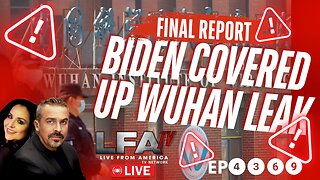Premium Only Content

VMT Tax is the WRONG WAY to Fund Our Infrastructure
Vehicle Mileage Traveled Tax EXPLAINED | Pros & Cons
If the U.S. Department of Transportation was run by somebody with decades of administrative transportation experience then one could make an argument for giving the department even more power, but instead, it’s run by Pete Buttigieg.
A small-town mayor who made a national name for himself by running a failed presidential campaign. He clearly wasn’t chosen to lead our trillion-dollar transportation sector because of his experience.
Anyway, during one of his many TV interviews, Pete suggested the federal government should consider implementing a Vehicle Miles Traveled Tax, which is a “policy of charging motorists based on how many miles they have traveled.”
But first, as a matter of principle, the largest government in human history shouldn’t be implementing new taxes, programs, or regulations that have NEVER BEEN FULLY IMPLEMENTED ANYWHERE IN THE WORLD BEFORE!
There should be a long track record of success on a multi-state and/or multi-national level before moving forward with any new policy proposal no matter how wonderful it may sound on paper.
In the United States, a VMT fee currently exists as part of a limited program for 5,000 volunteers in Oregon and for trucks in Illinois. These are just “pilot programs” though. And internationally, Germany, Austria, Slovakia, Czech Republic, Poland, Hungary, Belgium, Russia, and Switzerland have implemented various forms of commercial truck VMT fees, but they HAVEN'T done so for passenger cars!
With that said, there ARE three main reasons why one would support a VMT Tax…
First, as Pete pointed out the federal government is receiving billions of dollars less in gas tax revenue each year due to more fuel-efficient and electric vehicles.
Second, Democrats tend to dislike flat taxes hence why they call any of them a “regressive tax,” i.e. “a tax applied uniformly, therefore taking a larger percentage of income from low-income earners than from high-income earners.”
And lastly, often public policies become law because some corporate lobbyist is pushing for it behind-the-scenes, i.e. The Affordable Care Act was pushed by Big Pharma and Big Insurance hence why they have bigger profits now more than ever before. And so a VMT tax would reduce the economic incentive to buy more fuel-efficient vehicles therefore the tax may actually “increase purchases of less fuel-efficient vehicles.”
This leads me to why, for the time being, a federal VMT Tax is a terrible policy proposal…
First is it'd lead to more air pollution. You see, if you really want to gauge if a politician believes we're in a climate emergency then look into if they support raising the federal gas tax. I understand it’s regressive, but it’s offset by the fact the U.S. has the most progressive tax code in the world! The top 10% pay 71% of federal income taxes. With that said, I support raising taxes on the 1% in order to bring down the national debt, but my point here is Democrat politicians shouldn’t dishonestly feign horror over a “climate emergency” if they’re only willing to hold people accountable whose vote they don’t depend on. Economists, environmentalists, and Elon Musk are CLEAR that raising the gas tax is the single best thing the federal government could do to curb carbon emissions. Economics 101: you should have to pay for your negative externalities!
Second, a VMT Tax would decrease your privacy, i.e. Big Brother would be watching when and where you go at all times in order to tax your movement. No thanks. With that said, VMT Tax proponents have proposed a variety of theories that could help protect some of a driver’s data, but personally I'd prefer not to be a guinea pig.
And finally, A VMT tax would increase the complexity of our already overcomplicated federal government. You see, in order to reduce some of the downsides I previously mentioned, a VMT tax could charge drivers different rates depending on your income, your vehicle weight/efficiency/speed, the roads you're driving on, the state you're in, the device or payment method you chose, etc. This information would then have to be shared on a multi-department and multi-state level. So you can therefore see how this system applied to over 286 million registered vehicles could get complicated real fast, especially for a small-town mayor who has a busy media schedule. If you thought the rollout of Obamacare was a car crash then just wait until this gets the green light!
READ ESSAY @ https://www.anthonygalli.com/
-
 2:20:30
2:20:30
The Dilley Show
7 hours ago $21.42 earnedRoger Stone in Studio plus Q&A Friday! w/Author Brenden Dilley 12/27/2024
49.3K7 -
 1:57:02
1:57:02
The Charlie Kirk Show
5 hours agoThe Great H-1B Battle + AMA | Lomez | 12.27.24
120K111 -
 11:39
11:39
Russell Brand
1 day agoWhat You're Not Being Told About The Syrian War
140K217 -
 LIVE
LIVE
Bannons War Room
1 year agoWarRoom Live
9,194 watching -
 1:49:21
1:49:21
Film Threat
8 hours agoBEST AND WORST OF 2024 + SQUID GAME SEASON 2 | Film Threat Livecast
46.9K5 -
 1:06:04
1:06:04
The Big Mig™
22 hours agoGlobal Finance Forum Powered By Genesis Gold Group
39.4K2 -
 34:38
34:38
Tudor Dixon
6 hours agoThe Changing Landscape Between Tech and Politics with Mike Benz | The Tudor Dixon Podcast
30K4 -
 2:23:58
2:23:58
Matt Kohrs
17 hours agoRumble's Stock Is EXPLODING!!! || The MK Show
88.9K8 -
 1:57:47
1:57:47
LFA TV
20 hours agoBOMBSHELL FINAL REPORT: BIDEN ADMIN SUPPRESSED WUHAN LAB LEAK | LIVE FROM AMERICA 12.27.24 11am EST
52.1K6 -
 43:07
43:07
Grant Stinchfield
6 hours ago $8.44 earnedWe Built it... China Controls it... Trump Will Take it Back!
31.6K14